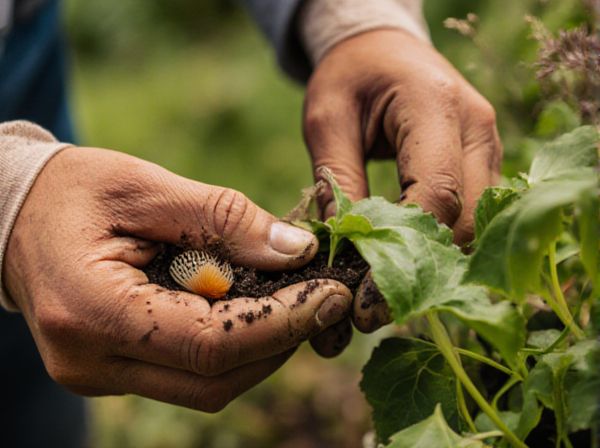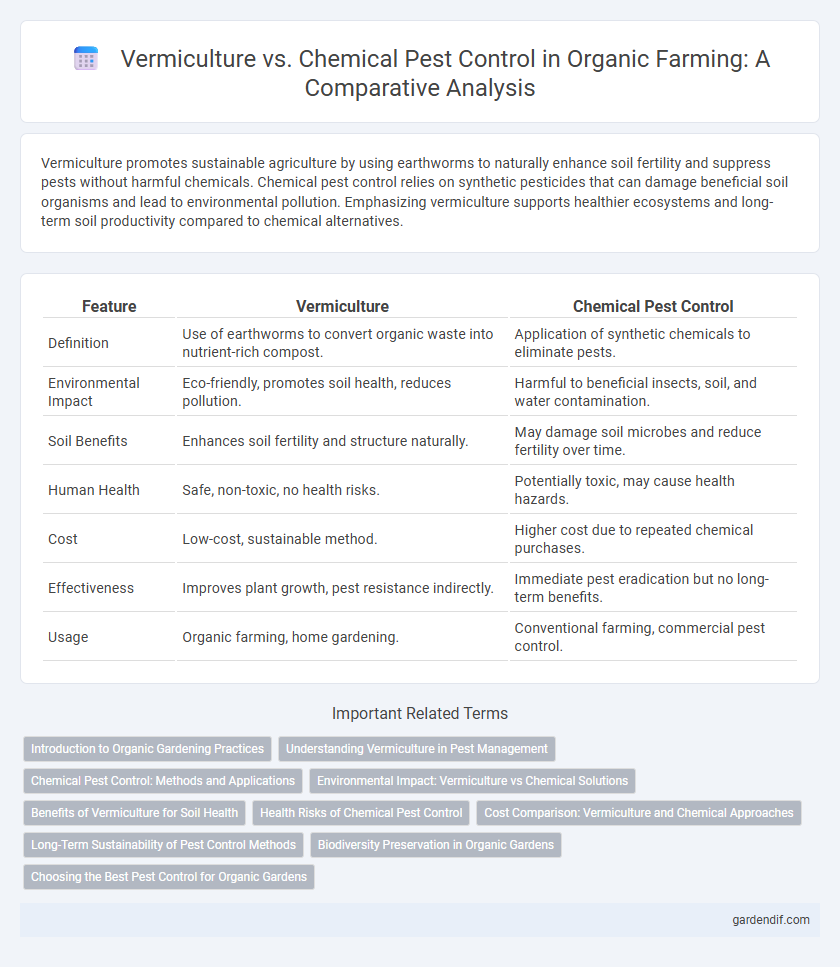
Vermiculture vs Chemical pest control Illustration
Vermiculture promotes sustainable agriculture by using earthworms to naturally enhance soil fertility and suppress pests without harmful chemicals. Chemical pest control relies on synthetic pesticides that can damage beneficial soil organisms and lead to environmental pollution. Emphasizing vermiculture supports healthier ecosystems and long-term soil productivity compared to chemical alternatives.
Table of Comparison
| Feature | Vermiculture | Chemical Pest Control |
|---|---|---|
| Definition | Use of earthworms to convert organic waste into nutrient-rich compost. | Application of synthetic chemicals to eliminate pests. |
| Environmental Impact | Eco-friendly, promotes soil health, reduces pollution. | Harmful to beneficial insects, soil, and water contamination. |
| Soil Benefits | Enhances soil fertility and structure naturally. | May damage soil microbes and reduce fertility over time. |
| Human Health | Safe, non-toxic, no health risks. | Potentially toxic, may cause health hazards. |
| Cost | Low-cost, sustainable method. | Higher cost due to repeated chemical purchases. |
| Effectiveness | Improves plant growth, pest resistance indirectly. | Immediate pest eradication but no long-term benefits. |
| Usage | Organic farming, home gardening. | Conventional farming, commercial pest control. |
Introduction to Organic Gardening Practices
Vermiculture enhances soil fertility through nutrient-rich worm castings that promote healthy plant growth, contrasting with chemical pest control that may harm beneficial organisms and disrupt soil ecosystems. Organic gardening practices prioritize natural pest management by encouraging earthworm activity, leading to sustainable soil structure and improved plant resilience. Utilizing vermiculture supports a balanced garden environment, reducing reliance on synthetic chemicals and fostering long-term ecological health.
Understanding Vermiculture in Pest Management
Vermiculture harnesses the natural process of earthworm activity to improve soil health and enhance pest resistance by promoting beneficial microbial populations, reducing the reliance on harmful chemical pesticides. Unlike chemical pest control, vermiculture supports sustainable agriculture by increasing organic matter decomposition and nutrient cycling, which strengthens crop immunity against pests naturally. This method contributes to a healthier ecosystem and long-term soil fertility, making it an effective and eco-friendly pest management strategy.
Chemical Pest Control: Methods and Applications
Chemical pest control involves the use of synthetic pesticides, herbicides, and insecticides to manage pest populations in agricultural settings. Common methods include foliar sprays, soil treatments, and seed coatings, which target specific pests to protect crops from extensive damage. Despite its effectiveness in rapid pest eradication, chemical pest control often raises concerns regarding environmental impact, pest resistance, and residue on food products.
Environmental Impact: Vermiculture vs Chemical Solutions
Vermiculture enhances soil health by promoting beneficial microorganisms and improving nutrient cycling, resulting in reduced chemical runoff and lower environmental pollution. Chemical pest control often leads to soil degradation, water contamination, and harm to non-target species, disrupting ecological balance. Sustainable vermiculture practices mitigate environmental damage while chemical solutions contribute to long-term ecosystem harm.
Benefits of Vermiculture for Soil Health
Vermiculture enhances soil health by increasing microbial activity and enriching organic matter, which leads to improved nutrient cycling and soil structure. Worm castings produced through vermiculture contain beneficial microbes and essential nutrients like nitrogen, phosphorus, and potassium that promote plant growth. Unlike chemical pest control, vermiculture supports sustainable agriculture by maintaining soil fertility without introducing harmful toxins or disrupting beneficial soil organisms.
Health Risks of Chemical Pest Control
Chemical pest control poses significant health risks due to the toxic chemicals that can contaminate air, water, and soil, leading to acute poisoning or long-term illnesses such as cancer and neurological disorders. Exposure to synthetic pesticides has been linked to respiratory problems, skin irritation, and reproductive issues in both humans and beneficial organisms. Vermiculture offers a safer alternative by naturally enhancing soil health and promoting pest resistance without introducing harmful residues into the environment.
Cost Comparison: Vermiculture and Chemical Approaches
Vermiculture reduces costs by utilizing earthworms to naturally decompose organic waste into nutrient-rich compost, lowering the need for chemical fertilizers and pesticides. Chemical pest control involves recurring expenses for synthetic pesticides, which may also harm beneficial soil organisms and require protective equipment for safe application. Over time, vermiculture offers a more sustainable and cost-effective solution by enhancing soil health and reducing dependency on costly chemical inputs.
Long-Term Sustainability of Pest Control Methods
Vermiculture promotes long-term sustainability in pest control by enhancing soil health and fostering natural predator populations that suppress pest outbreaks. Chemical pest control often disrupts ecological balance, leading to pesticide resistance and soil degradation over time. Sustainable pest management relies on organic methods like vermiculture to maintain biodiversity and reduce environmental impact.
Biodiversity Preservation in Organic Gardens
Vermiculture enhances biodiversity preservation in organic gardens by fostering beneficial microorganisms and earthworms that improve soil health and nutrient cycling. Chemical pest control disrupts soil ecosystems, reducing the diversity of soil fauna and harming non-target species essential for ecological balance. Maintaining rich biodiversity through vermiculture supports resilient organic gardens and sustainable pest management.
Choosing the Best Pest Control for Organic Gardens
Vermiculture enhances soil health by promoting beneficial microorganisms and natural predators that control pests without harmful residues, making it ideal for organic gardens. Chemical pest control often disrupts soil ecology, leading to pest resistance and potential harm to beneficial insects and humans. Choosing vermiculture supports sustainable pest management and aligns with organic practices by maintaining ecosystem balance and minimizing synthetic inputs.
Vermiculture vs Chemical pest control Infographic

 gardendif.com
gardendif.com